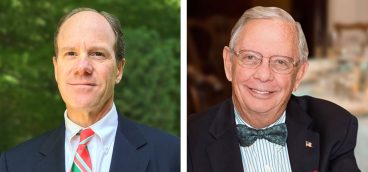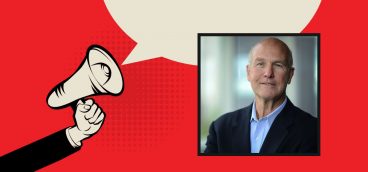Leading the Way

We asked five high-profile executives: What do you believe to be the most important ingredients of successful leadership?
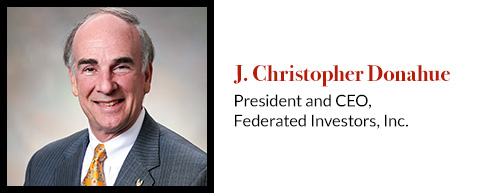
J. Christopher Donahue, president and CEO, Federated Investors, Inc.
Lessons on leadership can come from the unlikeliest sources—even works of art. An example can be found in what may be the most important work in the prized art collection housed at The Duquesne Club Downtown, “When Shadows Hint Death,” a 1915 oil painting by Charles Russell. The vivid Old West scene depicts two men with horses scrambling to conceal themselves from a party of Native Americans in full war headdress who, as they travel on a ridge above, cast ominous shadows on the opposite canyon walls, signaling to the cowboys the danger of their position. This Western frontier moment offers striking leadership parallels to ever-present dangers in business. A company’s sustainable growth is only possible so long as it can avoid or adapt to a never-ending stream of challenges—new government regulations, the emergence of competition, or changing customer preferences. Business leaders must remain vigilant. The marketplace is always hinting the death of products and business methods, and therefore, demands creative responses.
I’ve also acquired many thoughts on leadership from my late father, John F. Donahue, who founded Federated Investors, Inc., more than 60 years ago. In emphasizing that employees should enjoy coming to work, one of his favorite encouragements, like my earlier example, related to the world of art. That was, “Paint your own picture (but stay on the canvas).” Respect individual talents and give people the tools they need to be successful—not just an education, but a philosophy of doing business the right way with an emphasis on proper principles. This fits into the principle of subsidiarity, which emphasizes decentralized authority and lets the workers who are closest to the customers have power over relationships. The collateral benefit to this philosophy is enhanced collegiality. This strengthens corporate culture. And culture eats strategy for lunch.
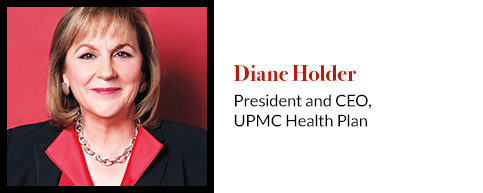
Diane Holder, president and CEO, UPMC Health Plan
Occasionally, one has the privilege of meeting a great leader. Someone who inspires, communicating a purpose much larger than themselves. A few years ago, I met an amazing woman, a physician, who despite great risk, was leading a resistance organization in her war-torn country where women and children were being systematically brutalized. Jailed repeatedly (once within 24 hours of giving birth to her daughter) she held fast to her belief that women would lead the change in her country. “Women,” she explained, “are the lubricant and the live wire of change.”
Great leaders, in the service of humankind, differ in style, philosophy, behavior and context, but share a capacity to turn vision into something you can touch and feel. They have a moral compass and the courage to act. They exude a passion for not only what is, but what can be. They make tough decisions, but are compassionate and never forget that their decisions impact real people whose lives matter. Great leaders generate energy in those around them, and harness the power of the group to make an impact that no one person could achieve alone. Great leaders lead with their hearts and their minds. They know that people are at their best, and do their best, when they understand and recognize the human, as well as the technical, elements required for success. They first tell a story about “why” what they do matters, and then support and inspire those around them to deliver on the “what” and the “how.” It is clear the next generation has the monumental task of building global solutions in an increasingly complex and technologically driven world. We all share an obligation to shape and inspire tomorrow’s leaders, to develop and foster greater diversity and inclusion, and to nurture a safe and thriving nation.
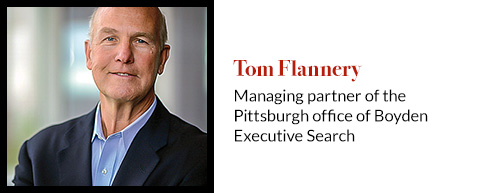
Tom Flannery, managing partner of the Pittsburgh office of Boyden Executive Search
If you think about the leaders who have arisen in the last several hundred years, you will quickly conclude that they come in different packages. Gender, color, ethnicity and body shape are as inconsequential to leadership as are, unfortunately, integrity and a strong moral compass. George Washington and Joseph Stalin were both effective leaders, but one of them had qualities most of us admire and the other was a sociopath—a common disorder among bad leaders.
To me, the three most important ingredients of leadership in the abstract are courage, vision and the ability to communicate effectively. Leaders acquire that moniker because they have the courage to express their views in a public forum, blaze new trails and are able to attract followers by effectively articulating their messages. If you think of recent leaders, good and bad, Winston Churchill, Martin Luther King, Angela Merkel, Mother Teresa on the good side; Saddam Hussein, Adolf Hitler, Hugo Chavez and Mao Zedong on the bad side. I think most of us will agree that they all possessed those three critical ingredients.
To create what most Americans would consider a great leader, you have to ditch the sociopathic behavior and substitute the leader’s compulsion to put the organization he or she is shepherding in front of himself or herself. That requires integrity, a strong moral compass, self-sacrifice and a dash of humility. George Washington was the best example I can think of, but I would put Sid Crosby in that league as well.
Regarding the question about whether leaders are born or made, I think courage can be summoned by most people, given the right situation. Vision is a gift bestowed on a small percentage of the population, and the ability to communicate is an acquired skill. Given that, I hope the people who are possessed of all the right qualities to be great leaders will step up. The world could use a little leadership at the moment.
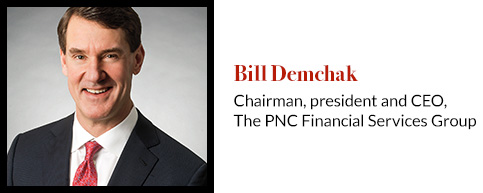
Bill Demchak, chairman, president and CEO, The PNC Financial Services Group
Effective leadership can take many forms, but in my experience, it comes down to four things.
First, good leaders have the ability to assemble teams of talented people and to harness the power in the diversity of thought and experiences among them. I’ve never seen a group of people who all look and think the same do anything truly transformative. As a leader, I want to build teams of people who challenge convention and who challenge each other to elevate their thinking, transcend their individual limitations, and come up with new solutions that solve problems and create value for the people we serve.
Second, good leaders commit their organizations to doing right by the people they serve, and they establish accountability from the top. I can’t ask employees throughout my company to take responsibility for fixing problems and delivering great customer experiences if I’m not committed to doing so myself. No matter where you are within an organization, taking ownership and solving problems is one of the surest paths to establishing yourself as an effective leader.
Third, good leaders invest in the future. They understand and anticipate customers’ needs and build solutions to meet them through time. They are curious and passionate about figuring out what’s next in service of their customers. They work toward the future by developing the skills of their employees and by giving people opportunities to stretch, take risks and grow into leaders themselves.
Lastly, good leaders aren’t afraid to admit mistakes or weaknesses because they know that leadership is about always working to be better each day than you were the day before. And when we can be honest with ourselves and others about those areas where we have room for improvement, we’re more likely to invest ourselves and our resources in being better tomorrow.
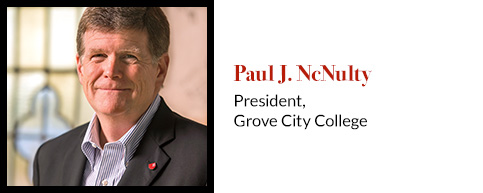
Paul J. McNulty, president, Grove City College
In the immediate aftermath of the 9-11 terrorist attacks, I was in the FBI’s Operations Center with the attorney general and the FBI director. Days later I became the U.S. attorney in eastern Virginia and took responsibility for overseeing the investigative response to the attacks. These and other challenges have served as clear reminders for me that effective leaders must be prepared for life’s most demanding circumstances.
While experience enhances one’s judgment, two ethical convictions are necessary for the best form of leadership. The first conviction is that integrity must never be compromised. Leaders who do the right things for the right reasons will win the respect of their colleagues and serve the best interests of their organizations. The second conviction is that every person is created in the image of God and deserves to be treated with dignity and respect. This conviction should produce a continuous regard for the well-being of those under one’s care. Seeing these attributes in its leader, a team often performs at the highest level.
More than 30 years of service in Washington, including many years on Capitol Hill and at the Justice Department, gave me plenty of opportunity to study leadership. As a young lawyer on the House Ethics Committee, I observed compromised integrity. I also witnessed the lack of appreciation for the sacrifices and dedication of staff. Now I am privileged to serve 2,400 students in the formative stage of life alongside hundreds of colleagues committed to equipping them for their callings in this world. It’s obviously a long way from the days of terrorism prosecutions, but this is may be my greatest leadership challenge. My highest hope is that through our efforts and by God’s grace, Grove City College students will develop into leaders of the highest proficiency, purpose and principles ready to advance the common good.

